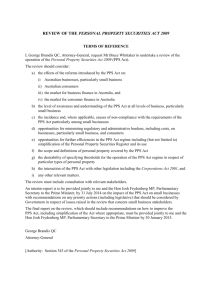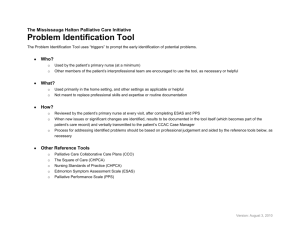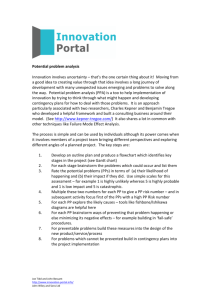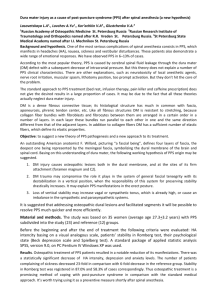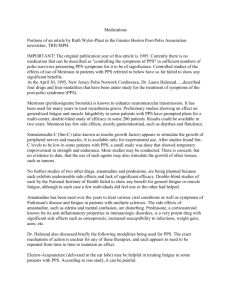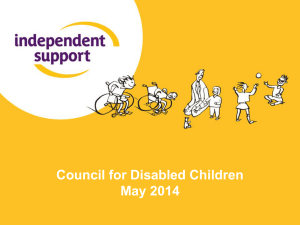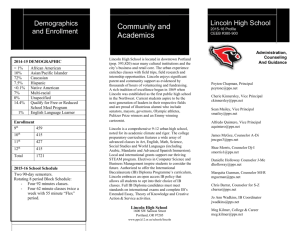National Parent Partnership Network response
advertisement
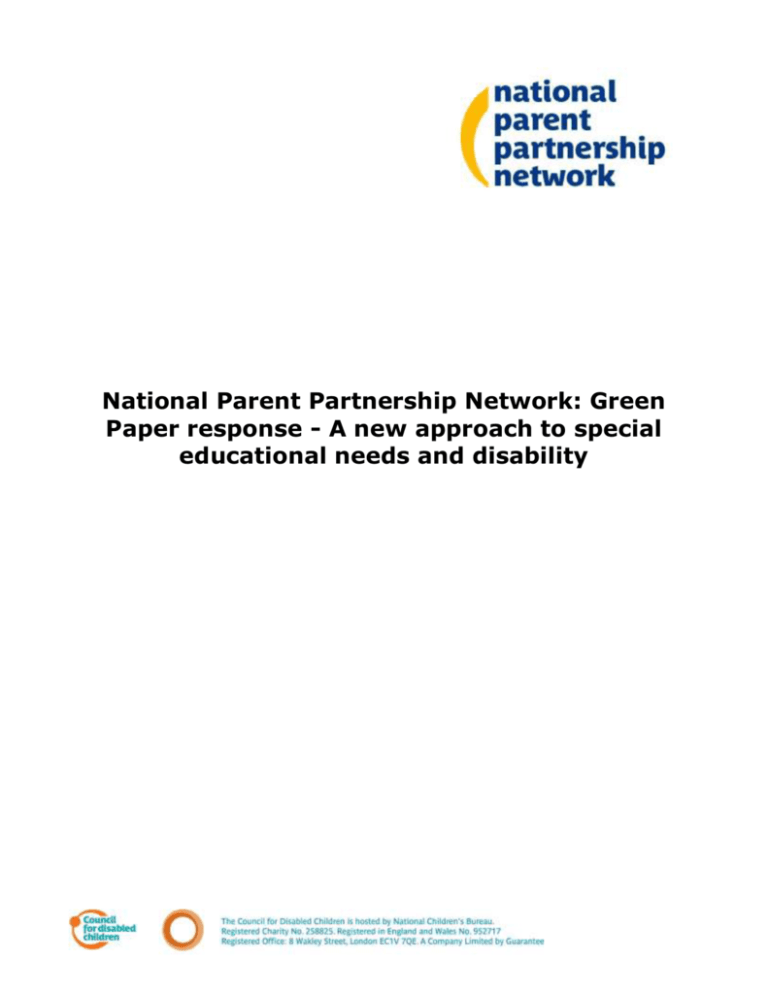
National Parent Partnership Network: Green Paper response - A new approach to special educational needs and disability ABOUT NPPN The National Parent Partnership Network (NPPN) was established in 1995 under the aegis of the Council for Disabled Children (CDC). It is funded by the Department for Education (DfE) to support and develop the work of parent partnership services across England. INTRODUCTION The comments, opinions and suggestions expressed in this response were shaped by a number of consultation events with parent partnership service (PPS) staff alongside several events with parent groups across the country. Quotes are included in italics and have come directly from parents or PPS staff. We were very pleased to see a mention of PPS included in the Green Paper although we are a little confused about the statement about the most effective services being those providing independent supporters, while this may indeed be true there is no evidence that we know that supports this. The national evaluation of PPS was clear that the most effective services were those that were the most well resourced (Rogers, Todd, Parsons et al 2006). GENERAL AREAS OF CONCERN This response will go through and comment where appropriate, each chapter of the Green Paper, however there are a few overarching areas that we would like to comment on first. 1) We welcome the clear analysis that the Government have on the issues facing children and young people who are disabled or have SEN and their families. 2) There is concern that while this Green Paper is presented as a new approach to SEN and disability there is very little included about meeting the needs of the vast majority of children and young people who have SEN but do not meet the criteria for a statement or a plan. Stronger position for parents of children and young people with complex needs but what about the rest? 3) We do not recognise a ‘bias toward inclusion’ in our experience many parents ‘choose’ specialist provision after a failure of mainstream to either meet their child’s needs or to offer them a place. This is particularly acute at secondary transfer when parents are often told by schools that they are unable to meet their child’s needs. Thus many parents who express a preference for a mainstream school (being equally able to do so for a special school) find that in reality this is not an option. There is also much concern that inclusion is now seen in a negative light. ‘Reducing the bias towards inclusion’ seems a backwards step as inclusion has improved acceptance, tolerance and understanding within society. 4) We are concerned that there is little recognition of the Equality Act duties which sit alongside a schools SEN duties and responsibilities. Parents have found the equality duties an incredibly useful tool when working with schools to ensure that their child’s needs are being met. 5) There was a feeling in most of the parent groups and meeting that we attended that this was a Green Paper informed by and meeting the wants of a small group of vocal and enfranchised parents. The majority of parents simply want to send their child to school and have the right to have a good school for their child. We thought that the Green Paper reflected the interests of perhaps a very well informed but minority of parents. 6) There is a notable absence throughout the Green Paper of the voice of children and young people. 7) There must be a robust system for challenging statutory agencies who do not comply – in particular with the Equality Act, but also if the new EHCP does not deliver. Parents do not want to be solely responsible for holding providers to account EARLY IDENTIFICATION AND ASSESSMENT NPPN welcomes the emphasis on multi agency working in the Green Paper, however we are concerned that unless this emphasis is supported by shared information, budgets, statutory responsibilities, accountability and attitudes it is unlikely to result in any change on the ground. Parents will need high quality, accessible information, advice and support around this new system, backed up by high quality training and provided by people who are able to give information about the law and how this translates into local arrangements. At present PPS are the only statutory services who are providing this across the country. Single Assessment NPPN welcomes the proposal for a single assessment process for children and young people from the age of 0-25 and we hope that it will build on existing assessment processes, in particular the Common Assessment Framework. EHCP We welcome the ideal of an Education, Health and Care Plan but would firstly suggest a change in title to ‘Statement of Education, Health and Care’ to avoid confusion with the multitude of health plans in existence (including the Emergency health Care Plan or EHCP). Secondly without similar statutory obligations on health and social care as there are currently on education we are unclear as to how this would differ (other than the welcome 0-25 age range) hugely from the current statements of special educational needs? There would need to be a single point of redress for parents, we would assume an extension of the role of the current SEND tribunal. We would also like to highlight the difficulties that many parents have in getting support before, during and after a tribunal, while the PPS exemplifications are clear that PPS should provide this support, too often they either do not have the resources or their LA refuses to allow them to carry this work out. Information, Advice and Support Parents will need access to one agency able to provide them with accurate and up to date information, advice and support around health, education and social care. At present, while most PPS provide this type of support informally, their statutory responsibilities are around education. We would like to see the remit of PPS to be extended to cover health and social care and the legal training that they presently have to support the impartiality and quality of their education work to be extended to support this. PPS will continue to work closely with local voluntary and community organisations to ensure that parents have access to support from agencies that are not funded by the Local Authority and will continue to signpost parents to these organisations. It is however essential that there is one central point where parents can go to access support PPS are in a clear position to fulfil this role. Parents with greater disadvantage will be even more disadvantaged unless support easily accessible to them 0-25 The national benchmarking of PPS 2010 shows that 20% of services cover the 025 age range with the other 80% going up to 19. There will be clear resource and training issues that will need to be addressed to ensure that all services are able to extend their service to 25. PPS will also need to think about how they work with young people and their parents and possibly make formal links with or extend their service to include young people’s advocacy services Capacity While we welcome the opportunity to extend and expand the remit of PPS there is concern about resourcing and capacity. There is huge variation in the funding and staffing of PPS as seen below: NPPN carries out national benchmarking of PPS on an annual basis and the statistics below pulled from last year’s report show the vast differences in size and resourcing across the country. • Budget for PPSs 2010 – 2011 ranged from £14,000 - £623,000 National mean £104,720 • Staffing levels ranged from 0.4 – 16.6 National mean - 2.76 These figures were collected before many of the recent cuts and we are seeing a significant reduction in both funding and staffing levels. We would welcome DfE and Ofsted working together to encourage and support local authorities in providing a PPS that meets at least Good Practice in the DfE exemplifications as suggested in the Lamb Inquiry 2010. More information to process - will need better access for information and support to access and utilize it. Must be provided by people with accurate/up to date training re: the laws and local arrangements GIVING PARENTS CONTROL Local Offer PPS will be central to the local offer as a service that all LAs provide for parents of children/young people who have or may have SEN. In addition PPS have a key role in: • Supporting parents in working with the LA to develop the local offer • Ensuring that the local offer is accessible for all parents and is readily and easily available • Working with parents in using the local offer to secure support for their child • Supporting parents when this support is not in place/offered Choice It was felt that while a lot was made of the Green Paper increasing choice, in reality there was no change in the current status quo, i.e. parents are able to express a preference for any state maintained school, including academies and free schools. It is also true that unless all schools are willing and happy to take all children then parents do not have any real choice. Several PPSs have expressed concern that there is no mention of transport in the Green Paper as this is often the issue that restricts parents’ choice of school and is one of the most constant and contentious issues around SEN provision. As most LAs no longer have choice advisers much of this work has been taken on/back by parent partnership services with obvious demands on already reduced resources and staff. Personal Budget There is concern that the burden of responsibility, decision making, organisation and bureaucracy is being placed on parents. The experience of PPS is that most parents want their child to go to a good local school and for their needs to be met, as happens for all other children. Keyworkers Parent Partnership Services are in the privileged position of having an informal, supportive and non decision making role in the life of the families they work with and are often in the best position to gather information about all the needs of the child and of their family. In this way PPS staff have often, informally performed a keyworking role for some families at particular times of need. Many services have also worked closely with Early Support keyworkers and have found this a very positive and helpful; model. We are, however, unclear about the definition, role and responsibility of ‘keyworkers’ as mentioned in the Green Paper. Mediation Parent Partnership Services already provide informal mediation between parents and schools and parents and the LA. In addition some PPS staff are trained mediators and provide formal mediation in reciprocal arrangements with other LAs. It would not always be appropriate for PPS staff to provide formal mediation within their own LA i.e. when they have previously been involved in the case, however this is an area in which PPS have a wealth of experience and we hope this will be acknowledged and supported in any future mediation proposals. We feel that the early and effective involvement of PPS can often negate the need for both formal mediation and tribunals. Mediation is not a process that either party can be required to attend and we are concerned by any suggestion that this might be the case. Parent Forums Parent partnership services and NPPN welcome the continuation of funding for parent forums and look forward to continuing and developing our relationships both locally and nationally. LEARNING AND ACHIEVING Single SEN Category Te removal of a graduated approach in school may make it harder for schools to put in context for parents the level of their child’s needs, their progression and the next steps. Indicator in performance tables We welcome the proposal to include an indicator in the performance tables to give parents information on the progress of the lowest attaining pupils and will ensure that PPS are able to support parents in using this information appropriately. PREPARING FOR ADULTHOOD PPS have a responsibility to ensure that the voice of the child/young person is heard. The extension of the single assessment and the Education, Health and Care Plan till 25 will mean that many more young people will need their own impartial information, advice and support. We would welcome a model where PPS manage or work closely with specialist advisers/advocates for children and young people to ensure that this happens and that all those involved are able to work together to plan for the future WORKING TOGETHER FOR FAMILIES Code of Practice The Code of Practice provided clear and relevant guidance that is invaluable for parents and their supporters in working with (and challenging where necessary) schools and local authorities. As a framework for meeting the needs of children and young people with SEN and with or without a statement it is generally felt to be a useful one, problems tend to lie with compliance with and accountability for the existing law and guidance. IEPs A well planned and managed IEP is of huge benefit to parents, schools and pupils. The present SEN Code of Practice is clear about the requirement for schools to involve parents in the setting of individual targets and is generally viewed as one of the most positive ways in which schools and parents can work together to support a child. IEPs are also incredibly useful as part of schools evidence in supporting a case for statutory assessment.
![013—BD Global [DOC 117KB]](http://s3.studylib.net/store/data/005892885_1-a45a410358e3d741161b3db5a319267b-300x300.png)
